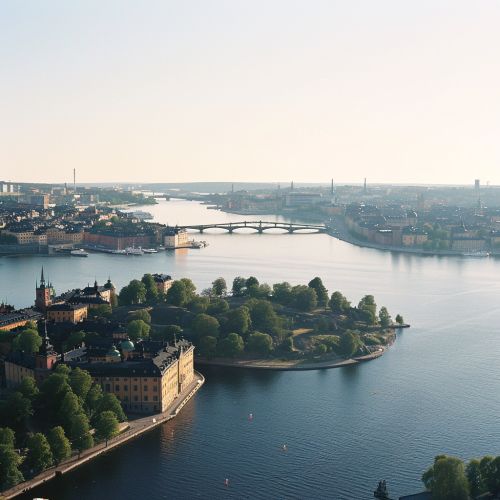Stockholm
Geography
Stockholm, the capital city of Sweden, is located on the country's eastern coast, where the freshwater Lake Mälaren meets the Baltic Sea. The city is spread across 14 islands, which are connected by more than 50 bridges. This unique geographical layout has earned Stockholm the nickname "Venice of the North". The city's central area, known as Stockholm City Centre, is situated on the water, with the Old Town, or Gamla Stan, occupying the largest of these islands.

History
The earliest known settlement in the Stockholm area was established on the island of Björkö in 1000 BC. The city itself was founded in 1252 by Birger Jarl, a Swedish statesman and military leader. Stockholm's strategic location on the Baltic Sea made it an important center for trade and commerce, and it quickly grew in size and influence. The city's history is marked by periods of prosperity, such as during the late Middle Ages when it was a major hub of the Hanseatic League, and periods of conflict and hardship, including the Stockholm Bloodbath in 1520 and the Great Fire of 1720.
Demographics
As of 2020, Stockholm has a population of approximately 975,000 residents within the city limits, making it the most populous city in Sweden. The Greater Stockholm area, which includes the city's suburbs, has a population of over 2.3 million. The city is known for its diversity, with residents representing over 180 nationalities. The official language is Swedish, but English is widely spoken due to the city's international nature.
Economy
Stockholm is the economic heart of Sweden, contributing a significant portion to the country's GDP. The city is home to numerous multinational corporations, including Ericsson, H&M, and Spotify. It also boasts a thriving startup scene, earning it the nickname "Silicon Valhalla". The city's economy is diverse, with major sectors including information technology, finance, media, and tourism.
Culture
Stockholm is a vibrant cultural hub, known for its museums, art galleries, and music festivals. The city is home to the Nobel Prize ceremonies, held annually at the Stockholm Concert Hall and the Nobel Banquet at the City Hall. Stockholm's Old Town, Gamla Stan, is a UNESCO World Heritage site, known for its well-preserved medieval architecture. The city also boasts a thriving food scene, with a number of Michelin-starred restaurants.
Education
Stockholm is home to several prestigious universities and higher education institutions, including the Stockholm University, the Royal Institute of Technology, and the Karolinska Institute. The city's education system is known for its high standards and commitment to research and innovation.
Transportation
Stockholm's transportation network is extensive and efficient, encompassing buses, trams, ferries, and the Stockholm Metro, known as Tunnelbana. The city's main airport, Stockholm Arlanda Airport, is the largest in Sweden and serves as a major hub for international travel.
Sports
Stockholm has a rich sports culture, with football being the most popular sport. The city is home to several top-tier football clubs, including AIK, Djurgårdens IF, and Hammarby IF. Stockholm also regularly hosts international sporting events, including the annual Stockholm Marathon and the DN Galan Diamond League athletics meeting.
